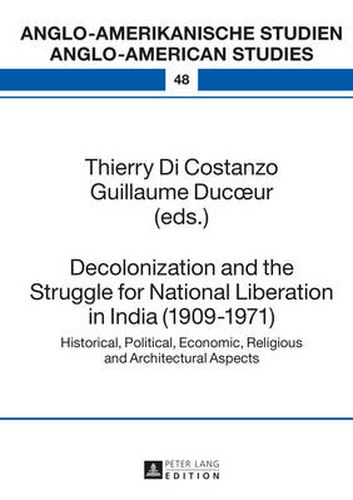Readings Newsletter
Become a Readings Member to make your shopping experience even easier.
Sign in or sign up for free!
You’re not far away from qualifying for FREE standard shipping within Australia
You’ve qualified for FREE standard shipping within Australia
The cart is loading…






This title is printed to order. This book may have been self-published. If so, we cannot guarantee the quality of the content. In the main most books will have gone through the editing process however some may not. We therefore suggest that you be aware of this before ordering this book. If in doubt check either the author or publisher’s details as we are unable to accept any returns unless they are faulty. Please contact us if you have any questions.
At the end of the First World War, the Raj remained economically or even strategically more central than ever in the general colonial architecture of the British Empire. Yet, between the two World Wars, the colonial regime hung only by a thread when confronted with the rising popularity of the nationalist movements. As a result, independence was granted in 1947 to this major component of the Empire, a truly cataclysmic event for the remainder of the world. This reality conflicts with the idea that a well-managed, peaceful decolonization process was launched by the British authorities. The independence of British India proceeded at the same speed as the Partition of British India which had both immediate and distant, but surely terrible, consequences like the 1971 war with Pakistan over Bangladesh.
$9.00 standard shipping within Australia
FREE standard shipping within Australia for orders over $100.00
Express & International shipping calculated at checkout
This title is printed to order. This book may have been self-published. If so, we cannot guarantee the quality of the content. In the main most books will have gone through the editing process however some may not. We therefore suggest that you be aware of this before ordering this book. If in doubt check either the author or publisher’s details as we are unable to accept any returns unless they are faulty. Please contact us if you have any questions.
At the end of the First World War, the Raj remained economically or even strategically more central than ever in the general colonial architecture of the British Empire. Yet, between the two World Wars, the colonial regime hung only by a thread when confronted with the rising popularity of the nationalist movements. As a result, independence was granted in 1947 to this major component of the Empire, a truly cataclysmic event for the remainder of the world. This reality conflicts with the idea that a well-managed, peaceful decolonization process was launched by the British authorities. The independence of British India proceeded at the same speed as the Partition of British India which had both immediate and distant, but surely terrible, consequences like the 1971 war with Pakistan over Bangladesh.